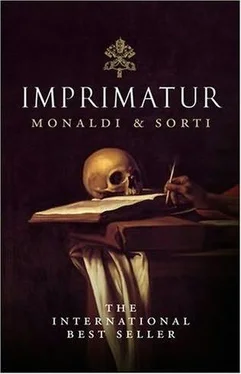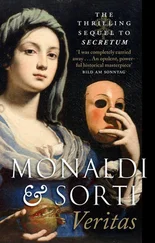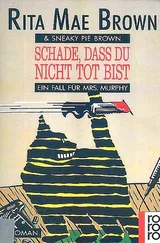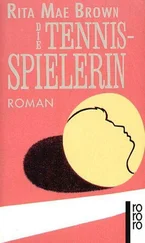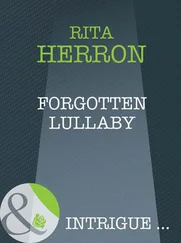Rita Monaldi - Imprimatur
Здесь есть возможность читать онлайн «Rita Monaldi - Imprimatur» весь текст электронной книги совершенно бесплатно (целиком полную версию без сокращений). В некоторых случаях можно слушать аудио, скачать через торрент в формате fb2 и присутствует краткое содержание. Жанр: Исторический детектив, на английском языке. Описание произведения, (предисловие) а так же отзывы посетителей доступны на портале библиотеки ЛибКат.
- Название:Imprimatur
- Автор:
- Жанр:
- Год:неизвестен
- ISBN:нет данных
- Рейтинг книги:5 / 5. Голосов: 1
-
Избранное:Добавить в избранное
- Отзывы:
-
Ваша оценка:
- 100
- 1
- 2
- 3
- 4
- 5
Imprimatur: краткое содержание, описание и аннотация
Предлагаем к чтению аннотацию, описание, краткое содержание или предисловие (зависит от того, что написал сам автор книги «Imprimatur»). Если вы не нашли необходимую информацию о книге — напишите в комментариях, мы постараемся отыскать её.
Imprimatur — читать онлайн бесплатно полную книгу (весь текст) целиком
Ниже представлен текст книги, разбитый по страницам. Система сохранения места последней прочитанной страницы, позволяет с удобством читать онлайн бесплатно книгу «Imprimatur», без необходимости каждый раз заново искать на чём Вы остановились. Поставьте закладку, и сможете в любой момент перейти на страницу, на которой закончили чтение.
Интервал:
Закладка:
"Why wonder?" said Melani, calling me back from my silent reflections. "One should not be surprised that a Queen should prefer my voice to that-may God forgive me-of a mere canterina. In Paris, I was often accompanied by an Italian singer, a certain Leonora Baroni, who did try so very hard. Today, no one remembers her. Mark my words, young man: if women are not today permitted to sing in public, as Saint Paul so rightly willed it, that is certainly not a matter of chance."
He raised his glass as though for a toast, and solemnly recited:
Toi qui sais mieux que aucun le succes que jadis les pieces de musique eurent dedans Paris, que dis-tu de Pardeur dont la cour echaujfee frondoit en ce temps-la les grands concerts d'Orphee, les passages d'Atto et de Leonora, et le dechainement qu'on a pour l’Opera?'
I remained silent, allowing myself no more than a questioning glance.
"Jean de la Fontaine," said he, emphatically. The greatest poet in France."
"And, if I heard well, he wrote about you!"
"Yes. And another poet, a Tuscan this time, said that the singing of Atto Melani could be used as a remedy against a viper's bite."
"Another poet?"
"Francesco Redi, the greatest man of letters and science in all
Tuscany. Such were the muses on whose lips my name travelled, my boy."
"Do you still appear before the French royal family?"
"Once youth has vanished, the voice is the first of the body's virtues to become unreliable. As a young man, however, I sang in the courts of all Europe, and thus had occasion to make the acquaintance of many princes. Nowadays, they are pleased to ask me for advice, when they must take important decisions."
"You are then… a counsellor abbot?"
"Yes, let us say that."
"You must often be at court, in Paris."
"The court is now at Versailles, my boy. As for myself, that is a long story."
And, frowning, he added: "Have you ever heard of Monsieur de Fouquet?"
The name was, I replied, utterly unknown to me.
He poured himself another glass of wine and fell silent. His silence caused me no embarrassment. We remained thus awhile, without proffering a word, lulled by a spark of reciprocal sympathy.
Atto Melani was still dressed as he had been that morning: with his abbot's periwig, hood and grey-mauve soutane. Age (and his did not show) had enveloped him with a fine layer of fat which softened a rather hooked nose and severe features. The white powder on his face, which changed to carmine on his prominent cheeks, spoke of a perennial conflict of instincts; his broad, wrinkled forehead and arched eyebrows suggested a cold and haughty nature. Yet that was only a pose: it was contradicted by the mocking fold in his fine, contracted lips and in his slightly receding, but fleshy, chin, in the midst of which sat an impertinent dimple.
Melani cleared his throat. He drank a last draught and kept the wine in his mouth, letting it smack between his tongue and his palate.
"We shall make a pact," said he all of a sudden. "You need to know everything. You have not travelled, you have experienced nothing, seen nothing. You are perspicacious; one remarks certain qualities immediately. But without a helping hand at the outset, you will never arrive anywhere. Well, in the twenty days of claustration that lie before us, I can give you all that you need. You, in exchange, will help me."
I was astounded. "In what way?"
"What the deuce, to find out who poisoned Monsieur de Mourai!" answered the abbot, as though it were the most obvious thing in the world, and he gazed at me the while with a little half-smile.
"Are you certain that this was poisoning?"
"Absolutely," exclaimed he, standing up and moving around in search of something to else to eat. "The poor old man must have swallowed something lethal. You heard the physician, did you not?"
"And what does it matter to you?"
"If we do not stop the assassin in time, he will soon strike down other victims here."
Fear dried my throat at once, and any remaining appetite abandoned my poor stomach.
"By the way," asked Atto Melani, "are you quite sure of what you told Cristofano about the broth which you prepared and served up to Mourai? Is there nothing else that I should know?"
I repeated to him that I had never taken my eyes off the pan, and I had personally administered the broth, sip by sip, to the gentleman. Any outside intervention must therefore be ruled out.
"Do you know if he took anything earlier?"
"I would say not. When I arrived, he had just risen and Dulcibeni had already gone out."
"And afterwards?"
"No, I think not. After serving him the broth, I prepared the basin for his foot bath. When I left him, he was dozing."
"That means only one thing," he concluded.
"Namely?"
"That you killed him."
He smiled at me. He was jesting.
"I shall serve you in all things," I found myself promising him, with my cheeks on fire, torn between emotion at the challenge which I faced and fear of the danger.
"Bravo. For a start, you could tell me all that you know about the other guests, and whether, in the last few days, you have noticed anything unusual. Have you heard any bizarre conversation? Has anyone been long absent? Have letters been delivered or dispatched?"
I responded that I knew very little, apart from the fact that Brenozzi, Bedfordi and Stilone Priaso had lodged at the Donzello at the time of the late Signora Luigia. I then mentioned, not without some hesitancy, that it seemed to me that Padre Robleda, the Jesuit, had gone at night to Cloridia's apartments. The abbot simply guffawed.
"My boy, from now on, you will keep your eyes open. Above all, you will watch the two travelling companions of old Mourai, the French musician Robert Devize, and Pompeo Dulcibeni, the Marchigiano."
He saw that I had lowered my eyes, and continued: "I know what you are thinking: you want to be a gazetteer, not a spy. Know then that the two trades are not so different from one another."
"But shall I need to know all that you mentioned a moment ago? About the Quietists, the Gallican Articles, and…"
"That is the wrong question. Some gazetteers have gone far, yet know little: only really important things."
"And what are those?"
"Things which they will never write. But we shall speak of that tomorrow. Now let us go and sleep."
While we were climbing the stairs, I glanced in silence at the abbot's white face by the light of the lantern: here was my new master, and I savoured all the excitement of the situation. True, all had come to pass so very suddenly, yet I was vaguely aware that Melani was imbued with a similar secret pleasure at having me for a disciple. At least for as long as the quarantine lasted.
The abbot turned towards me before we took leave of each other, and smiled. Then he disappeared down the second-floor corridor, without a word.
I spent a good part of the night sewing together some old clean leaves of paper piled up on the table where my master kept his accounts, and then writing down on these the recent events which I had witnessed. I had decided: I would not lose a single word of what Abbot Melani had taught me. I would transcribe it all and conserve it jealously.
Without the help of those ancient notes today, sixteen years later, I could not be here compiling these memoirs.
Day the Second
12th September, 1683
The morning after, I awoke to a strange surprise. I found Signor Pellegrino asleep on his bed, in the chamber which we shared under the eaves. He had made no preparation whatever for our guests' repast; which, despite our exceptional circumstances, was nevertheless required of him. My master, dressed in the clothes he had worn the evening before, lay sprawled across the bedcovers, showing every sign of having fallen asleep under the influence of some cheap red wine. After rousing him with some difficulty, I went to the kitchen. As I was descending the stairs, I heard, drawing ever nearer, a distant cloud of sounds, confused at first, albeit pleasant. As I drew closer to the entrance of the dining chamber, next to the kitchen, the music grew clearer and more intelligible. It was Signor Devize who, clumsily perched on a wooden stool, was practising his instrument.
Читать дальшеИнтервал:
Закладка:
Похожие книги на «Imprimatur»
Представляем Вашему вниманию похожие книги на «Imprimatur» списком для выбора. Мы отобрали схожую по названию и смыслу литературу в надежде предоставить читателям больше вариантов отыскать новые, интересные, ещё непрочитанные произведения.
Обсуждение, отзывы о книге «Imprimatur» и просто собственные мнения читателей. Оставьте ваши комментарии, напишите, что Вы думаете о произведении, его смысле или главных героях. Укажите что конкретно понравилось, а что нет, и почему Вы так считаете.
